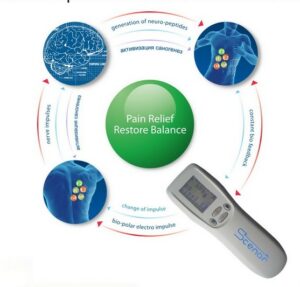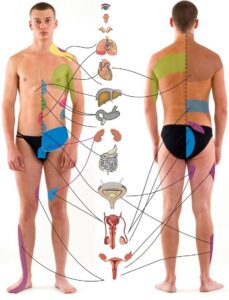 We know that the human skin and the inner organs have a tight connection through the nerve system. This connection already exists from the early stage of embryogenesis on, because both the nerve system and the skin are created from the same cells of the young embryo, the ectoderm. The nerve branches on their turn, are connected to every inner organ.
We know that the human skin and the inner organs have a tight connection through the nerve system. This connection already exists from the early stage of embryogenesis on, because both the nerve system and the skin are created from the same cells of the young embryo, the ectoderm. The nerve branches on their turn, are connected to every inner organ.
It is known that because of these connections, the nerve system plays an important role in the regulation of the activities and states of the inner organs.
Thanks to the reasons mentioned above, it is possible to regulate the state of the inner organs through the skin. SCENAR devices are used to affect the skin on those places that will lead to the specific regulation of inner organs, for example to treat diseases.

It is necessary to point out that the regulation of the inner organs through the skin is only one important effect of the treatment process. There are more aspects, and one of them is humoral regulation. While being placed on the skin, SCENAR is affecting the C-fibers of the nervous system. As a results, the channels of the C-fibers are easily opened and a huge amount of neuropeptides, like endorphins, are excreted from these fibers. These neuropeptides are spread all over the body very quickly. And we know that neuropeptides are the natural medicine for all pathological processes in the human body.
 Yet another important effect of SCENAR therapy is the successful training of the adaptive reactions. Adaptive reactions are unique, non-specific reactions of the body on any kind stimuli that could affect health. When the adaptive reactions are well trained, the body can heal itself and prevent the development of a wide variety of diseases.
Yet another important effect of SCENAR therapy is the successful training of the adaptive reactions. Adaptive reactions are unique, non-specific reactions of the body on any kind stimuli that could affect health. When the adaptive reactions are well trained, the body can heal itself and prevent the development of a wide variety of diseases.
SCENAR works by the principle of biofeedback. The system is measuring the activities of the various skin areas. Thanks to this, we can find the right places for treatment and define the specific treatment parameters.



2 Comments. Leave new
is this valuable for pelvic floor prolapse?
I’m a new user of the Scenar, just received and started using it yesterday, and are already feeling some benefit. I look forward to some long term benefits.